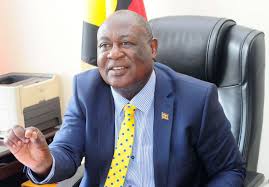Hon. Sam Mayanja, the Minister of State for Lands, has highlighted the urgent need to register the remaining 70% of Uganda’s land, mostly customary land, which remains insecure and prone to disputes in Uganda
Officiating at the International Land Conference, held at Speke Resort Munyonyo on November 21st 2024 he pointed out the limitations this poses for agricultural commercialization and investment.
The minister shared insights into the government’s initiatives, including the Parish to Market initiative, designed to boost socio-economic transformation through land utilization.
He also emphasized the need for Uganda to shift from subsistence land practices to a market-driven system, particularly given the country’s projected population growth to 50 million by 2035 and 100 million by 2050. His recommendations included lowering surveying costs, issuing digital land titles, and formalizing communal land ownership.
The conference gathered experts, policymakers, and stakeholders to discuss innovative land reforms that address social equity, economic growth, and climate change under the theme “Land Reforms for Inclusive Social Economic Transformation, and Climate Change Mitigation.” The conference emphasized the need for comprehensive reforms to promote sustainable development, better land use, and equitable social transformation.
Lands Permanent Secretary Mrs. Dorcas Okalany,emphasized the critical role of the land sector in driving economic growth and wealth creation. She noted the importance of land registration and productive utilization, pointing out that nearly 70% of Uganda’s land remains unregistered. This poses challenges to economic competitiveness and ecological sustainability.
Hon. Raphael Magyezi, the Minister for Local Government, underscored ongoing efforts by local governments to develop physical planning systems that integrate climate change measures.
Magyezi highlighted the importance of modernizing land administration to promote economic empowerment and environmental sustainability. He praised initiatives like the National Land Information System (NLIS) and Rapid Physical Planning Interventions (RAPPA) for supporting sustainable land practices and mapping critical ecosystems.
Andrew Nyumba, Secretary of the Uganda Land Commission (ULC), presented on the challenges of managing government land, citing a lack of legal frameworks, budgetary constraints, and operational inefficiencies. He emphasized the need for reforms and pointed to achievements like improved staffing and financial management.
Nyumba outlined future plans, including digitizing records, operationalizing the Land Fund, and lobbying for the enactment of the ULC Bill 2017. He reiterated the commission’s commitment to working with partners to overcome these challenges.
Nadege Orlova, a Senior Land Administration Specialist at the World Bank’s Uganda Country Office, emphasized the need for transformative land reforms to improve Uganda’s economic competitiveness, as the land sector contributes less than 0.1% to GDP.
She also highlighted the importance of strengthening land markets, improving rural land tenure security, and increasing revenue from the land sector to support national development.
Sulaiman Akbari closed off the International Land Conference on behalf of the World Bank Africa and the CEDP Uganda Task Team, reaffirmed shared commitments to inclusive land management and sustainable development.

